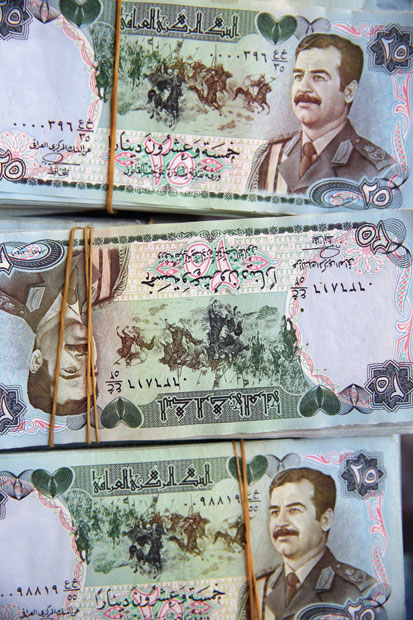In the passport queue at Baghdad airport, my heart sinks. This place vies with Cairo for the title of most venal airport in the Middle East. Our luggage is minutely examined by the Mukhabarat, or secret police, then customs. Early morning becomes mid-afternoon. Our papers (scrupulously in order) lie unattended on a desk. Eventually, a customs man, with a large moustache and belly hanging over his belt, waddles over. ‘We cannot stamp these today,’ he says. ‘We will have lunch now, and then we will sleep. Come back tomorrow. Or the next day.’ Our bags are moved into a room piled high with luggage seized from other TV crews: flak jackets, lights, someone’s camera and editing gear. ‘How much?’ asks our fixer, wearily. ‘$600,’ says the customs man, dropping any pretence that this is anything other than a shakedown.
Outside, the wall still has the faintest outline of a mural of Saddam, ‘the portrait’ as his ubiquitous image used to be simply known. ‘Things were better in Saddam’s time,’ says our fixer. ‘The customs only asked for $100. Maximum!’ He is a Sunni and over the week I often hear Sunnis reminisce fondly about the old dictator. ‘Even people who were in prison said he was fair,’ a Sunni sheikh tells me, improbably. ‘He made no difference between Sunni and Shia [the two great rival sects of Islam].’ Shiites, murdered in large numbers by Saddam, would disagree. They are in charge now, in the territory not part of the ‘Islamic State’ declared by the (Sunni) jihadis of Isis. A US TV correspondent says her network insists she avoids using ‘Shiites’ and ‘Sunnis’ in her reports: too complicated. Not for the first time, I wonder if President Bush really knew the difference before he invaded Iraq.
Our driver keeps up a running commentary as we edge through Baghdad traffic. ‘VBIED here; vest there; VBIED over there.’ These are places where a suicide attacker exploded a belt, or vest, or where there was a car bomb, or ‘vehicle-borne improvised explosive device’. An Iraqi friend working in a Baghdad hospital told me about a big car-bomb a couple of years ago. Amid the pandemonium, a young man sat in a wheelchair, his eyes taken out by shrapnel. ‘Just kill me,’ he said. ‘I can’t live like this.’ She refused. An hour later, he died anyway. The bombers have never really gone away. But people in Baghdad, especially in the Shiite areas, fear that with Isis almost at the gates, they will have to endure the worst wave of attacks yet.
We get stopped by the police half a dozen times a day. As soon as we bring out the camera, plain-clothes Mukhabarat materialise from nowhere. One tells me, ‘If you ask people any question critical of the government, or any question about the prime minister, we will arrest you.’ The prime minister, Nouri al-Maliki, has his own TV channel, or rather his party does. It plays stirring martial music and shows parades of goose-stepping soldiers. The news anchors wear camouflage combat gear and one — double take — holds a Kalashnikov upright on his desk as he reads the bulletin.
We sit in an outer office at the headquarters of the Shia militia Asa’ib ahl al-Haq, the League of the Righteous. It is commanded by an Iranian general and credited with bringing into Iraq the more efficient roadside bombs that killed hundreds of British and American troops. Al-Haq also kidnapped five Britons in 2007, four of whom died in captivity. We are asking to embed with them. A Shia cleric in flowing robes and white turban tells me, with a twinkle in his eye: ‘The enemies of the past are friends and the friends are enemies.’ Al-Haq would not be my first choice as a base to cover this conflict, but then our options are limited.
‘No problem. 100 per cent certain, I promise. Just phone back tomorrow.’ Tomorrow, tomorrow: the international press corps in Baghdad has been hearing this for two weeks as they beg for permits to film outside the city. In a moment of honesty, a minister’s aide tells me: ‘Just stop calling. Maliki himself has given the order that no [foreign] journalists can move until there’s a victory.’ A producer on a Shiite TV channel offers to put us in touch with the right people for places on an army helicopter… only $5,000. I ask a Sunni government official who has helped us in the past to see if this can be true. More or less, he says: $4,500. I assume the other $500 is the TV producer’s cut. It is $1,000 each for the helicopter pilots, apparently, and $2,500, or a Rolex, for the general.
The flow of money is not all one-way. The New York Times correspondent tweets a photograph of defence ministry officials handing out envelopes of cash to Iraqi journalists. The ministry tries to spin this as ‘travel expenses’ for reporters to attend a news conference given by the army spokesman, General Qassim Atta. But it is a bribe: only about £40, but over a month such payments can double the pittance local reporters get for doing a job that can easily get them killed. The Iraqi journalists are enraged, worried the money will dry up. The general was already in a bad mood with the foreign media for comparing him to ‘Comical Ali’, Saddam’s absurdly over-optimistic information minister. But the New York Times correspondent has also somehow gained access to the general’s bathroom and tweeted a picture of his gold-inlaid toilet. This is the final insult. The entire foreign press fears collective punishment. Meanwhile, half an hour’s drive from the general’s briefing room, Isis prepares its next move, with deadly serious intent.






Comments